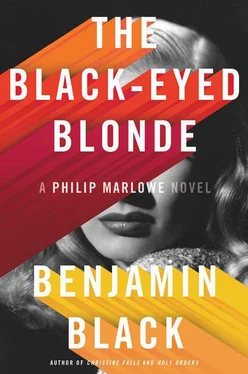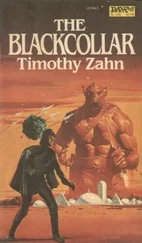“No, of course you don’t.” She turned aside and put her hand to the glass her husband had drunk from, moved it an inch to one side and then returned it to where it had been, standing on its own ring of dampness. “I’m sorry, I should have told you.”
I got out my cigarettes — the air in here had suddenly stopped feeling sanctified. “If you already knew he was dead, why did you come to me?”
She turned back and gazed at me in silence for a moment, judging what she would say, how she should put it. “The thing is, Mr. Marlowe, I saw him the other day, in the street. He didn’t look dead at all.”
I liked the idea of the outdoors. I mean I liked the thought of it being there: the trees, the grass, birds in the bushes, all that. I even liked looking at it, sometimes, from the highway, say, through a car windshield. What I didn’t much care for was being out in it, unprotected. There was something about the feeling of the sun on the back of my neck that made me uneasy — I didn’t just get hot, I got worried, in a twitchy sort of way. There was also the sense of being watched by too many eyes, trained on me from among leaves, from between fences, out of the mouths of burrows. When I was a kid I hadn’t been much interested in nature. Streets were where I did my boyhood wanderings and experienced my youthful epiphanies; I don’t think I’d have recognized a daffodil if I saw one. So when Clare Cavendish suggested a walk in the garden, I had to make an effort not to show how little the prospect excited me. But of course I said yes. If she had asked me to go on a hike in the Himalayas, I’d have put on a pair of mountain boots and followed her.
After she had pulled the pin and tossed me that grenade about having seen the supposedly dead Peterson, she had gone off to change, leaving me to stand at one of those curved glass walls looking out at the little puffs of white cloud sailing in from the ocean. As she was excusing herself, she had laid three fingers briefly on my wrist, where I could still feel them. If I’d thought before there was something fishy about this whole business, I had a hundred-pound marlin to grapple with now.
* * *
After fifteen minutes or so and a couple more cigarettes, she came back dressed in a white linen suit with box shoulders and a calf-length skirt. She may have been Irish, but she had all the poise and cool grace of an English rose. She was wearing flat shoes, which made me taller than she was by an extra couple of inches, but I still had that feeling of looking up at her. She wore no jewelry, not even a wedding ring.
She came up behind me quietly and said, “You probably don’t feel like walking, do you? But I have to get outside — my mind works better in the open air.”
I might have asked why she needed to have her thinking apparatus in tip-top working order, but I didn’t.
There was this to be said for the grounds of Langrishe Lodge: they were about as far from a wilderness as they could get and still be covered in greenery, or what would have been greenery if the summer hadn’t turned most of it brown. We set off along a gravel path that led away from the house at a right angle and headed straight as a stretch of railroad toward that stand of trees I’d seen from the road and, farther off, a few flashes of indigo that I knew must be the ocean. “All right, Mrs. Cavendish,” I said. “Let’s hear it.”
I had put more of a grating note into it than I’d meant to, and she gave me a quick sideways glance, her cheeks coloring a little in that way I was getting used to. I frowned and cleared my throat. I felt like a kid on his first date, everything I did a false move.
We had gone a dozen paces before she spoke. “Isn’t it strange,” she said, “the way you can recognize people instantly, no matter where you are or what the circumstances? You’re walking through Union Station in a rush-hour crowd and you glimpse a face a hundred yards ahead, or maybe not even a face, just the set of someone’s shoulders, the tilt of a head, and immediately you know who it is, even if it’s a person you haven’t seen for years. How is that?”
“Evolution, I guess,” I said.
“Evolution?”
“The need to distinguish friend from foe, even in the depths of the forest. We’re all instinct, Mrs. Cavendish. We think we’re sophisticated, but we’re not — we’re primitives.”
She gave a faint laugh. “Well, maybe evolution will make something of us someday.”
“Maybe. But you and I won’t be around to see it.”
For a moment the sunlight seemed shadowed, and we walked on in a somber silence. “Nice, the oaks,” I said, nodding toward the line of trees ahead of us.
“Beeches.”
“Oh. Beeches, then.”
“Shipped from Ireland, believe it or not, twenty years ago. Where nostalgia is concerned, my mother will spare no expense. They were saplings then, and look at them now.”
“Yes, look at them now.” I needed a cigarette again, but again the surroundings frowned on the thought. “Where did you see Nico Peterson?” I said.
She did not reply immediately. As she walked, she looked at the tips of her sensible shoes. “In San Francisco,” she said. “I was there on business — for the firm, you know. It was on Market Street, I was in a taxi, and there he was, walking along the sidewalk in that way he did, in a hurry, off”—she let out that faint laugh again—“off to see someone, no doubt.”
“When was this?”
“Let me think.” She thought. “Friday, last week.”
“Before you came to see me, then.”
“Of course.”
“You’re sure it was him?”
“Oh, yes, I’m sure.”
“You didn’t try to talk to him?”
“He was gone before I could think what to do. I suppose I could have told the driver to turn the taxi around, but the street was crowded — you know what San Francisco is like — and I didn’t think there’d be much hope of catching him. Besides, I was sort of numb and felt paralyzed.”
“From the shock?”
“No, the surprise. Nothing Nico did could ever shock me, really.”
“Even coming back from the dead?”
“Even coming back from the dead.”
At a distance, across the greensward, a horseman appeared, going at a fast clip. He raced along for a little way, then slowed up and disappeared under the trees. “That was Dick,” she said, “riding Spitfire, his favorite.”
“How many horses has he got?”
“I don’t really know. Quite a few. They keep him occupied.” I glanced at her and saw her mouth tighten at the corner. “He does his best, you know,” she said, in a tone of weary candor. “It’s not easy, being married to money, though of course everyone thinks otherwise.”
“ Did he know about you and Peterson?” I asked.
“I told you, I can’t say. Dick keeps things to himself. I hardly ever know what he’s thinking, what he’s aware of.”
We had reached the trees. The path veered off to the left, but instead of following it, Clare took me by the elbow and led me forward, into the copse, I guess you’d call it; it took a spot like Langrishe Lodge to get me trawling through my vocabulary for the right words for things. The ground underfoot was dry and dusty. Above us the trees made a parched, muttering sound — thinking of their native land, I supposed, where the air, it’s said, is ever damp and the rain falls with the lightness of something being remembered.
“Tell me about you and Peterson,” I said.
She was watching the uneven ground, stepping over it with care.
“There’s so little to tell,” she said. “The fact is, I’d almost forgotten him. I mean, I’d almost stopped remembering him, or missing him. There wasn’t very much between us when he was alive — when we were together, that is.”
Читать дальше












